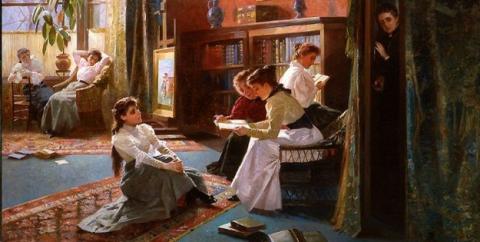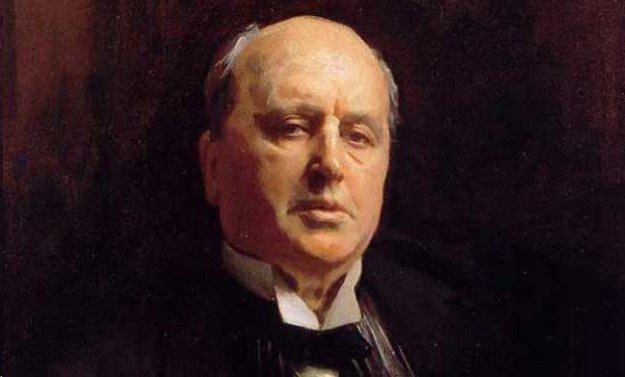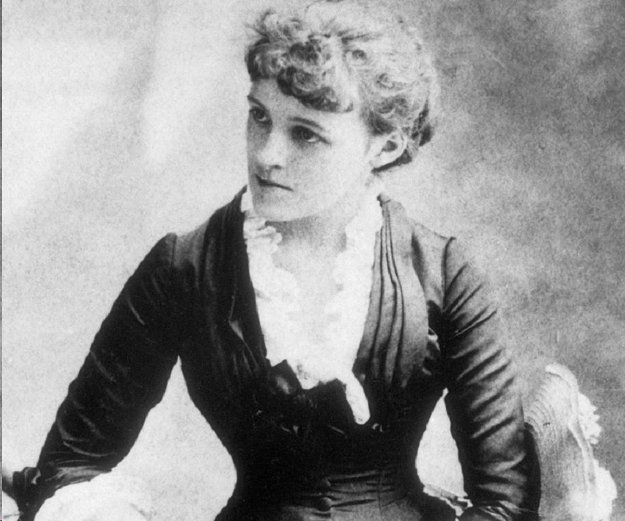The Master, the Protege, and the Ghost Story: Reading Henry James and Edith Wharton

To some, October is the most appropriate time to break out ghost stories. Really, though, the ghost story goes well in just about any season, but one that's especially underrated is winter — despite an illustrious history of the Victorian and Edwardian Christmas ghost stories. It might be hard to see how it works, and not a little of this might be an attempt to actively suppress any memories of that awful movie, Krampus, but telling or reading tales of the supernatural by the morose, red glow of the dying embers from a once roaring, jovial fire is a great way to end a busy winter day. The lone glow of a single weak bulb in an old lamp will also stand up admirably to the traditional setting, especially if you're alone and have no need or facilities for a fire.
Ghost stories may be an old genre, with a long history of now seemingly tired tropes, but a fair sampling is in order to give a reader an idea of their potential. A general volume including works from around the genre, including authors of varying specialties, is The Big Book of Ghost Stories. Otto Penzler's tasteful editing gives the reader an array of stories from a few different general themes. What Penzler's volume lacks, however, is the work of one of the genre's more patient, subtle touches, that of Henry James. By the editor's admission, he left out The Turn of the Screw because it's probably among the most anthologized ghost stories and one of its author's better-known contributions to the field; omitted, however, were any of the other ghost stories James produced. It's not a major slight for a writer largely considered a writer's writer, although his ghost stories and those of his friend, Edith Wharton, have a good deal of merit to stand on.
James' subtlety gives the reader surprise when they find out they're reading a ghost story. If one came upon “Owen Wingrave,” by chance, with nothing to suggest any supernatural elements, the reader might make it two-thirds of the way through before they got the impression it was a ghost story. The titular character gives the game away when he says, “Oh, the house — the very air and feeling of it. There are strange voices in it that seem to mutter at met — to say dreadful things as I pass. I mean the general consciousness and responsibility of what I'm doing. Of course it hasn't been easy for me.” The phrase “general consciousness” brings our thoughts to mind; it almost seems as if the reader is being pushed, ever so gently, to think a stressed cadet, dropping out of military school and moving away from a field in which centuries of his ancestors have made their living, is now feeling a great deal of stress and hearing voices.

In “The Romance of Certain Old Clothes,” we again see a domestic drama set up, this time between the Wingrave sisters — no relation to poor Owen is hinted — and Arthur Lloyd. While the title might be reminiscent of the medieval romance, in which matters supernatural were often a plot device, there's little to suggest anything supernatural throughout the tale up until the end. When Perdita says, “I would rather you should curse me outright,” might be construed as a hint, but certainly “Will you give me a year to live at least?” two lines later is an odd turn of phrase given the circumstances. Nothing in fiction happens without a reason, with Perdita dying a year later, our mind goes back to the line and we start to see something uncanny.
With many of James’ shorter ghost stories, one might feel he started writing something else and only midway through got the idea that this could be changed into a ghost story. Compared to a story like H. F. Arnold's “The Night Wire,” which crams a great deal of fear into two pages, James spends a lot of time before getting into anything chilling. One of the exceptions is “The Ghostly Rental.” The narrator, a young seminary student, goes on his afternoon walk and after passing by a dilapidated-looking house, takes an interest in it. After inquiring around, he finally hears the story behind the house, its mysterious war veteran owner, and his ghostly daughter.
The atmospherics are well done: “I came, as dusk was falling, to a narrow road which I had never traversed and which I imagined offered me a short cut homeward. I was about three miles away; I was late, and would have been thankful to make them two.... the stillness seemed peculiarly sensible.”
The house itself is a very well-described haunted house: “All this had once been painted white, but the broad back of time, leaning against the door posts for a hundred years, had laid bare the grain of the wood. Behind the house stretched an orchard of apple trees, more gnarled and fantastic than usual, and wearing, in the deepening dusk, a blighted and exhausted aspect. All the windows of the house had rusty shutters, without slats, and these were clearly drawn. There was no sign of life about; it looked blank, bare and vacant, and yet, as I lingered near it, it seemed to have a familiar meaning — an audible eloquence.” The narrator's vision is shifting, from the house to the orchard and back to the house, cramming more images of disorder and death into the reader's mind.

All told, excluding The Turn of the Screw, James might not be a top-rate writer of ghost stories. His legacy is hardly suffering after the admission. A writer close to James, perhaps even one who'd come to mind when asked if he had a protege, approached the ghost story with a much better touch. Edith Wharton's stories are different in their focus and their construction. Where James focuses on people of a higher caste, Wharton sneaks into the servant's quarters in “The Lady's Maids Bell” and “The Triumph of the Night.” For a writer generally thought of as writing about a bunch of upper-crusty ladies and their social circles, a la The Age of Innocence, it's a big leap but done quite well. Tensions between servants and masters appear in other stories as well, notably “Mr. Jones.” As estate management can be a large undertaking, the idea of a controlling servant, whose tenure has outlasted the house's occupants and whose word is peremptory undercuts what might be perceived as the way things ought to be.
Perhaps the most Jamesian of Wharton's ghost stories is “Pomegranate Seed.” The titular allusion perhaps hints at death and the afterlife in the mind of the reader. While the discussions of Kenneth and Charlotte linger over the possibility of another woman, Elsie, Kenneth's previous wife, lingers over their minds — just as her picture hung over the mantle, glowering down at the new wife. It's well constructed and keeps the reader guessing until the very end.
Here it seems, there isn't much connective tissue between the two. Wharton's ghost stories are far superior to James's shorter ghost stories. Henry James's twist is that there's a ghost story; on the other hand, Wharton's twists involve sex, murder, robbery and death. Compared to the more entertaining tradition, it's easy to see that Edith Wharton is probably underrated and Henry James fails to establish any longer-lasting dread.
Author Bio:
Adam Gravano is a contributing writer at Highbrow Magazine.
For Highbrow Magazine




























































































































































































































































































































